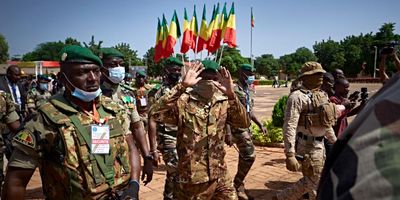Mali Removed From West African Regional Body Until Next Democratic Elections in 2022
Following its latest coup, Mali has been removed from the Economic Community of West African States (ECOWAS), without any trade sanctions, after the recently-instated President Colonel Assimi Goïta failed to attend the summit this past weekend.
Photo by MICHELE CATTANI/AFP via Getty Images
Mali has reportedly been removed from the Economic Community of West African States (ECOWAS). This comes after the last coup attempt, on May 24, where the transitional government's President Bah Ndaw, along with his Prime Minister Moctar Ouane and Defence Minister Souleymane Doucoure, were held in custody by the military. Colonel Assimi Goïta subsequently replaced Ndaw three days later through a questionable court decision. On Sunday May 30, fifteen ECOWAS members reportedly held a summit in Accra, Ghana where a decision to rescind Mali's membership until after the country's democratic election on February 27, 2022 was made. Goïta was invited to the meeting however he, reportedly, did not attend.
This is the second time in nine months that ECOWAS has taken such action against Mali. The first incident was following the violent ousting of then president Ibrahim Boubacar Keita in August 2020. ECOWAS' latest move is puzzling considering the regional body took the same decision, again. With sanctions in place, however, the country was brought to financial standstill. According to Business Day, without the sanctions neighbouring countries are concerned that the ostracisation of Mali by ECOWAS will influence instability and delay the reinstatement of democratic rule as the country is no longer accountable to the body. Furthermore, the actions could add fuel to the ongoing Jihadist insurgence, in West Africa, that has so far disturbed numerous presidential elections.
According to Africa Report, ECOWAS also called for Mali to appoint a new prime minister in order to carry out the 18-month long transitional government leading up to the 2022 elections. The regional body also reiterated that democratic elections cannot take place after February 27, 2022 as agreed upon. Those who currently hold government positions will not be eligible to run for the next presidential elections.
Read: UN & AU Call for Immediate Release of Malian President Bah Ndaw
ECOWAS seems to have accepted that the military is leading the country, a matter that France is not taking lightly. President Emmanuel Macron warned that France would withdraw all military reinforcements used to fight the Jihadist group as he "could not stand by a country where there is no longer any democratic legitimacy or transition".
Mali's removal from ECOWAS is yet another example of Africa's concerning inability to govern itself, even with regional bodies created to structurally support the continent. This past Tuesday, country leaders erupted into a physical fight at the Pan African Parliament (PAP) over the election of new leadership. The fight reportedly was incited by the conflict between the leaders from Western Africa and Southern Africa; a rotation of leadership was proposed. PAP is a body within the African Union which called for the release of Keita from military custody but ultimately failed to intervene in Mali's coup last week.
- Malian President Ibrahim Boubacar Keita Has Resigned Amid ... ›
- Calls for Immediate Release of Malian President Bah Ndaw ... ›
- ECOWAS Seeks Reintegration After Mali, Niger and Burkina Faso Form New Confederation - Okayplayer ›
- As Mali Purge Streets Of French Names, Locals Wonder If It’s A Priority | OkayAfrica ›
